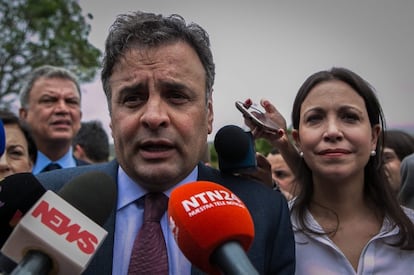Brazilian lawmakers condemn harassment by protestors in Caracas
Senate delegation forced to abandon trip to visit opposition leader after alleged incidents

Venezuela and Brazil have become entangled in a diplomatic spat after a group of Brazilian lawmakers, who had arrived in Caracas on Thursday to lend their support to a jailed opposition leader, were attacked by an angry mob and prevented from reaching their planned meeting points.
The six-member senate delegation, led by former Brazilian presidential candidate Aécio Neves, traveled to Caracas in a military jet as part of a “humanitarian mission” announced this week to demand the release of opposition leader Leopoldo López, who is on hunger strike at the Ramo Verde military prison outside Caracas.
Protestors started banging their hands against the vehicle and shouting revolutionary slogans
But the group was twice prevented from reaching the site where López is being held by protestors loyal to President Nicolás Maduro. López is in custody on sedition and other charges related to the violent anti-government protests that took place in February 2014.
About 40 people wearing red shirts – the official color of Chavismo – converged on the bus carrying the Brazilian politicians after they landed at Maiquetía “Simón Bolívar” International Airport outside Caracas. The demonstrators started banging their hands against the vehicle while shouting revolutionary slogans, one witness said.
Later, road blocks were set up along the only highway that links the airport on Venezuela’s Caribbean coastline with the capital.
Following the incidents, the government in Brasilia demanded that Venezuela offer police protection to the delegation, which Caracas later pledged to provide, the EFE news agency reported.
At the same time, lawmakers in Brazil denounced the incidents in Congress and, in a rare move, approved a motion of censure against the Maduro government.
Brazil’s Workers’ Party (PT), which has close relations with the Venezuelan regime, condemned the actions
Even Brazil’s ruling Workers’ Party (PT), which has close relations with the ruling United Socialist Party of Venezuela (PSUV), condemned the incidents.
“Brazil cannot accept any action by the Venezuelan government that impedes the rights of the Brazilian opposition to travel,” said PT parliamentary leader José Guimaraes.
All members of the Senate delegation come from opposition parties, including Neves, who represents the Brazilian Social Democratic Party (PSDB).
Venezuelan opposition leader Maria Corina Machado accused the government of purposely setting up the road blocks with the aim of also preventing the Brazilians from meeting other opposition leaders, including Caracas Mayor Antonio Ledezma, who is under house arrest facing coup plot charges. Venezuelan officials said the road blocks were part of street maintenance work that was already underway.
The Venezuelan government has already prevented former Spanish Prime Minister Felipe González, who has said he will help defend López at his trial, and several ex-Latin American presidents from seeing the jailed opposition leader. González left Venezuela just 48 hours after he arrived when he was refused entry to Ramo Verde prison.
After Thursday’s incidents and fearing for their safety, the Brazilian senators returned to the airport where they made calls to government officials in Brasilia, including Senate president Renán Calheiros, to seek some type of mediation.
Hours later, they announced that they would be returning to Brazil.
Upon their arrival, the delegation was met by the wives of López and Ledezma. The 43-year-old López is now on his 25th day of hunger strike and has lost 15 kilos, said his wife Lilian Tintori.
The opposition leader is demanding that Maduro set a date for this year’s parliamentary elections.
Tu suscripción se está usando en otro dispositivo
¿Quieres añadir otro usuario a tu suscripción?
Si continúas leyendo en este dispositivo, no se podrá leer en el otro.
FlechaTu suscripción se está usando en otro dispositivo y solo puedes acceder a EL PAÍS desde un dispositivo a la vez.
Si quieres compartir tu cuenta, cambia tu suscripción a la modalidad Premium, así podrás añadir otro usuario. Cada uno accederá con su propia cuenta de email, lo que os permitirá personalizar vuestra experiencia en EL PAÍS.
¿Tienes una suscripción de empresa? Accede aquí para contratar más cuentas.
En el caso de no saber quién está usando tu cuenta, te recomendamos cambiar tu contraseña aquí.
Si decides continuar compartiendo tu cuenta, este mensaje se mostrará en tu dispositivo y en el de la otra persona que está usando tu cuenta de forma indefinida, afectando a tu experiencia de lectura. Puedes consultar aquí los términos y condiciones de la suscripción digital.








































